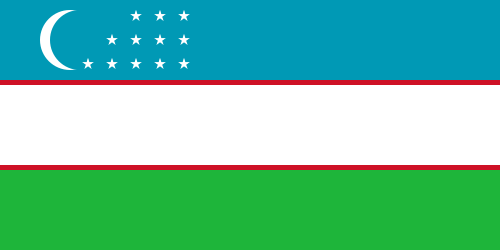 Uzbekistan, officially the Republic of Uzbekistan (Uzbek: O‘zbekiston Respublikasi or Ўзбекистон Республикаси) is one of the six independent Turkic states. It is a doubly landlocked country in Central Asia, formerly part of the Soviet Union. It shares borders with Kazakhstan to the west and to the north, Kyrgyzstan and Tajikistan to the east, and Afghanistan and Turkmenistan to the south.
Uzbekistan, officially the Republic of Uzbekistan (Uzbek: O‘zbekiston Respublikasi or Ўзбекистон Республикаси) is one of the six independent Turkic states. It is a doubly landlocked country in Central Asia, formerly part of the Soviet Union. It shares borders with Kazakhstan to the west and to the north, Kyrgyzstan and Tajikistan to the east, and Afghanistan and Turkmenistan to the south.
Once part of the Persian Samanid and later Timurid empires, the region was conquered in the early 16th century by Uzbek nomads, who spoke an Eastern Turkic language. Most of Uzbekistan’s population today belong to the Uzbek ethnic group and speak the Uzbek language, one of the family of Turkic languages.
Uzbekistan was incorporated into the Russian Empire in the 19th century and in 1924 became a constituent republic of the Soviet Union, known as the Uzbek Soviet Socialist Republic (Uzbek SSR). It has been an independent republic since December 1991.
Uzbekistan’s economy relies mainly on commodity production, including cotton, gold, uranium, potassium, and natural gas. Despite the declared objective of transition to a market economy, Uzbekistan continues to maintain rigid economic controls, which often repel foreign investors. The policy of gradual, strictly controlled transition has nevertheless produced beneficial results in the form of economic recovery after 1995. Uzbekistan’s domestic policies on human rights and individual freedoms are often criticised by international organizations. In Uzbekistan about 45% of the population live on less than US$1.25 per day.
Uzbekistan has a wide mix of ethnic groups and cultures, with the Uzbek being the majority group. In 1995 about 71% of Uzbekistan’s population was Uzbek. The chief minority groups were Russians(8%), Tajiks (5–30%), Kazaks (4%), Tatars (2.5%) and Karakalpaks (2%). It is said, however, that the number of non-Uzbek people living in Uzbekistan is decreasing as Russians and other minority groups slowly leave and Uzbeks return from other parts of the former Soviet Union.
When Uzbekistan gained independence in 1991, there was concern that Muslim fundamentalismwould spread across the region. The expectation was that a country long denied freedom of religious practice would undergo a very rapid increase in the expression of its dominant faith. As of 1994, well over half of Uzbekistan’s population was said to be Muslim, though in an official survey few of that number had any real knowledge of the religion or knew how to practice it. However, Islamic observance is increasing in the region.
Uzbekistan has a high literacy rate, with about 99.3% of adults above the age of 15 being able to read and write. However with only 88% of the under-15 population currently enrolled in education, this figure may drop in the future. Uzbekistan has encountered severe budgeting shortfalls in its education program. The education law of 1992 began the process of theoretical reform, but the physical base has deteriorated and curriculum revision has been slow.
Uzbekistan’s universities create almost 600,000 graduates annually.
Notes from Wikipedia








